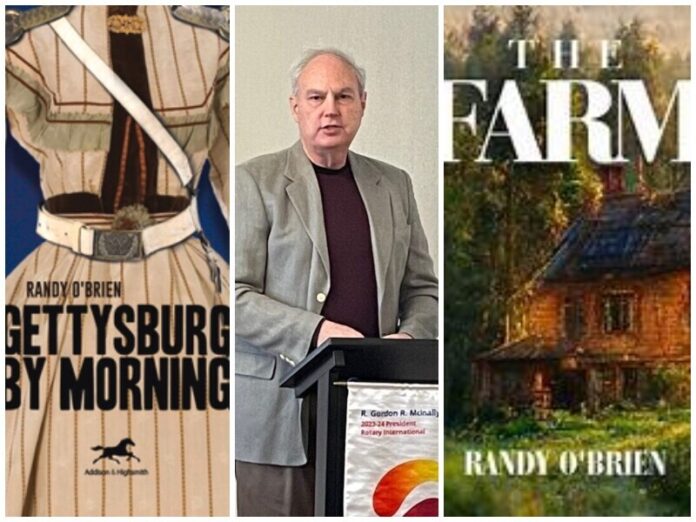Randy O’Brien is delving into his love of writing while building his second act in life. The award-winning radio journalist was the News Director for WMOT-FM for more than three decades. He also served as an adjunct writing instructor at Middle Tennessee State University (MTSU) and Watkins School of Art and Design. Now retired, he is the author of two historical fiction books that take place in Middle Tennessee, and he is at work on a third.
His most recent book, The Farm, is about how a young woman from a rural Middle Tennessee dairy farm, with dreams of becoming an actress in New York, handles the aftermath of a violent attack by a Nazi prisoner of war who escaped from Camp Nathan Bedford Forrest. The camp is based on a real camp for prisoners of war that was located in a forested area outside of Tullahoma, Tennessee.
“The main character is kinda based on my mother,” said O’Brien, “and we had a farm in Rucker, [Tennessee]. The idea is that my mother, and her two sisters, and her widowed mother, and a bachelor uncle, all lived together…And these became the template for…”The Farm.”
When cleaning out his mother’s house after her death, he saw several photos of his parents from that period that had been stored in the attic. It made him wonder what their lives would have been like locally during World War II. He had heard family stories about the time and of family characters.
Using these members of his family as the basis for the main characters in his story, the book explores the effect of the situation on the main character’s family, the options the young woman has, and the choices she makes once she discovers that she is pregnant from the rape.
“At the time, there were army regulations that if this sort of thing happened,” explained O’Brien, “a woman could go to an army base medical center and get an abortion. So, the question within the story is freedom of choice.”
The topic is an interesting one for the current time, with the repeal of Roe versus Wade taking away many women’s right to choose. Even in a case of rape.
O’Brien takes his reader on the wave of emotions that the young woman goes through as she deals with what happened to her and works her way to her final decision.
His goal was to recreate the experience of that tumultuous time. He has found that he is good at writing historical fiction about what it is like to live during times of war. Perhaps it is an opportunity to draw from his educational background at MTSU, where he graduated with a degree in English with a minor in History and Secondary education.
“I have always found writing to be a very positive expression for me, even when I was a child at Christiana Elementary School,” said O’Brien. “Then I went to Central High School, where I graduated from the last graduating class.”
The process is a lot of research. And O’Brien has found that many of the skills he gained as a journalist have helped him with his fiction writing.
“When I was a journalist,” he said, “I would have to draw facts and synthesize information into bite-sized bits…and the dramatist…[has] allowed [me] to express my viewpoints and ideas.”
His first book, Gettysburg by Morning, was inspired by an article he read about 200 documented cases of women who dressed up as men to fight in the Civil War. He tried to find a book about the Civil War written from the perspective of a woman dressed like a man. When he couldn’t find one, he decided that would be the topic of his first book.
“I said to myself, here is a niche,” said O’Brien. “I wrote the story with the idea of a young patriotic woman who…for the sake of her family, for the honor of her family, she takes her brother’s place (after he goes AWOL).”
The young woman fights at Gettysburg. O’Brien builds the scene as the Rebel line moves forward, following Lee in his gray uniform onto the battlefield, their bayonets shining in the morning light, dressed in tatters, reflecting the economic conditions of the South near the end of the war.
“When I am in the writing process,” explained O’Brien, “I try to write 1,000 words a day. You may say that is a lot, but it is only about four type-written pages. And I found that in the past I have done a lot of planning, but now I have decided that I am just going to just go with it. What we call that is that you are a “plotter” or a “pant-ser.” Which means you write by the seat of your pants. I am a “pant-ser” now, proudly, but it can get you into trouble because you can write a lot of stuff that doesn’t work, which means lots of editing, but you can’t edit a blank page.”
He captures the writing process in a few words. It is staring into space, being distracted, looking at a blank screen, and then, if you’re lucky, the magic happens and the words come and the character dances toward the denouement.



























